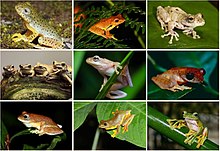Rhacophoridae
| Rhacophoridae | |
|---|---|

| |
| Rhacophoridae diversity | |
| Scientific classification | |
| Kingdom: | Animalia |
| Phylum: | Chordata |
| Class: | Amphibia |
| Order: | Anura |
| Clade: | Ranoidea |
| Family: | Rhacophoridae , 1932 |
| Subfamilies | |

The Rhacophoridae are a family of frogs that occur in tropical sub-Saharan Africa, South India and Sri Lanka, Japan, northeastern India to eastern China, south through the Philippines and Greater Sundas, and Sulawesi. They are commonly known as shrub frogs, or more ambiguously as "moss frogs" or "bush frogs". Some Rhacophoridae are called "tree frogs". Among the most spectacular members of this family are numerous "flying frogs".
Although a few groups are primarily terrestrial, rhacophorids are predominantly arboreal treefrogs. Mating frogs, while in amplexus, hold on to a branch, and beat their legs to form a foam. The eggs are laid in the foam and covered with seminal fluid before the foam hardens into a protective casing. In some species, this is done in a large group. The foam is laid above a water source so the tadpoles fall into the water once they hatch.[1]
The species within this family vary in size from 1.5 to 12 cm (0.59 to 4.72 in).[1] Like other arboreal frogs, they have toe discs, and those of the genus Chiromantis have two opposable fingers on each hand. This family also contains the Old World flying frogs, including Wallace's flying frog (Rhacophorus nigropalmatus). These frogs have extensive webbing between their fore and hind limbs, allowing them to glide through the air.[2]
Phylogeny[]
This phylogeny of the Rhacophoridae is from Yu et al. (2008):[3]
| Rhacophoridae |
| ||||||||||||||||||||||||||||||||||||||||||||||||||||||
Parasites[]
As many frogs, rhacophorids harbour monogeneans worms in their urinary bladders. The parasite species specialized to this family of frogs belong to the genus Indopolystoma, described in 2019.[4]
References[]
- ^ a b Zweifel, Richard G. (1998). Cogger, H.G.; Zweifel, R.G. (eds.). Encyclopedia of Reptiles and Amphibians. San Diego: Academic Press. pp. 99–100. ISBN 0-12-178560-2.
- ^ Sunny Shah & Rachna Tiwari (2001-11-29). "Rhacophorus nigropalmatus, Wallace's Flying Frog". AmphibiaWeb. Retrieved 2007-06-22.
Edited by Tate Tunstall (2003-04-12)
- ^ Yu Guohua, Rao Dingqi, Zhang Mingwang, Yang Junxing. Re-examination of the phylogeny of Rhacophoridae (Anura) based on mitochondrial and nuclear DNA. Molecular Phylogenetics and Evolution 50 (2009) 571–579. doi:10.1016/j.ympev.2008.11.023
- ^ Chaabane, Amira; Verneau, Olivier; Du Preez, Louis (2019). "Indopolystoma n. gen. (Monogenea, Polystomatidae) with the description of three new species and reassignment of eight known Polystoma species from Asian frogs (Anura, Rhacophoridae)". Parasite. 26: 67. doi:10.1051/parasite/2019067. ISSN 1776-1042.

- Cogger, H.G.; R.G. Zweifel; D. Kirschner (2004). Encyclopedia of Reptiles & Amphibians Second Edition. Fog City Press. ISBN 1-877019-69-0.
External links[]
 Data related to Rhacophoridae at Wikispecies
Data related to Rhacophoridae at Wikispecies Media related to Rhacophoridae at Wikimedia Commons
Media related to Rhacophoridae at Wikimedia Commons
- Rhacophoridae
- Amphibian families